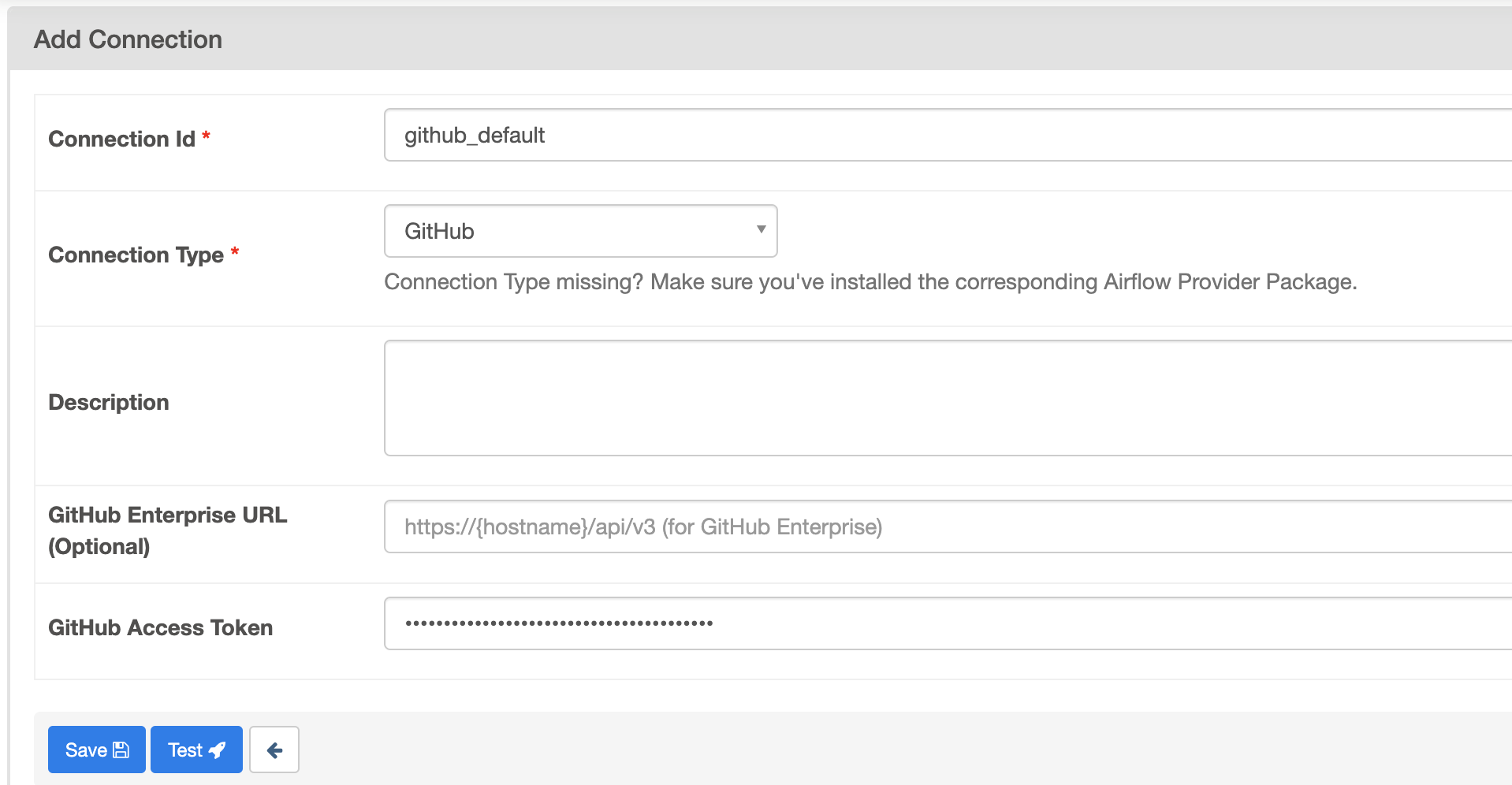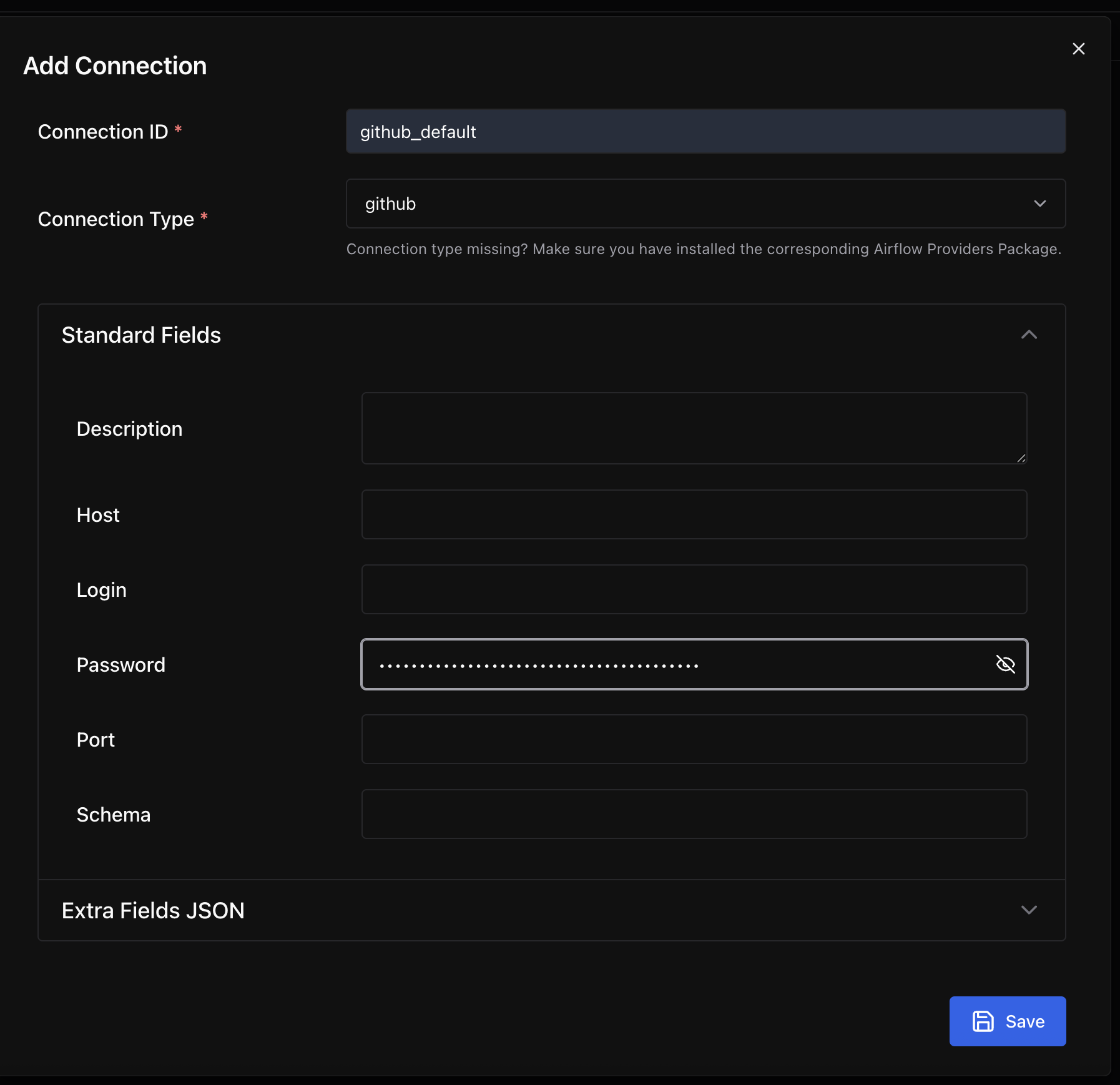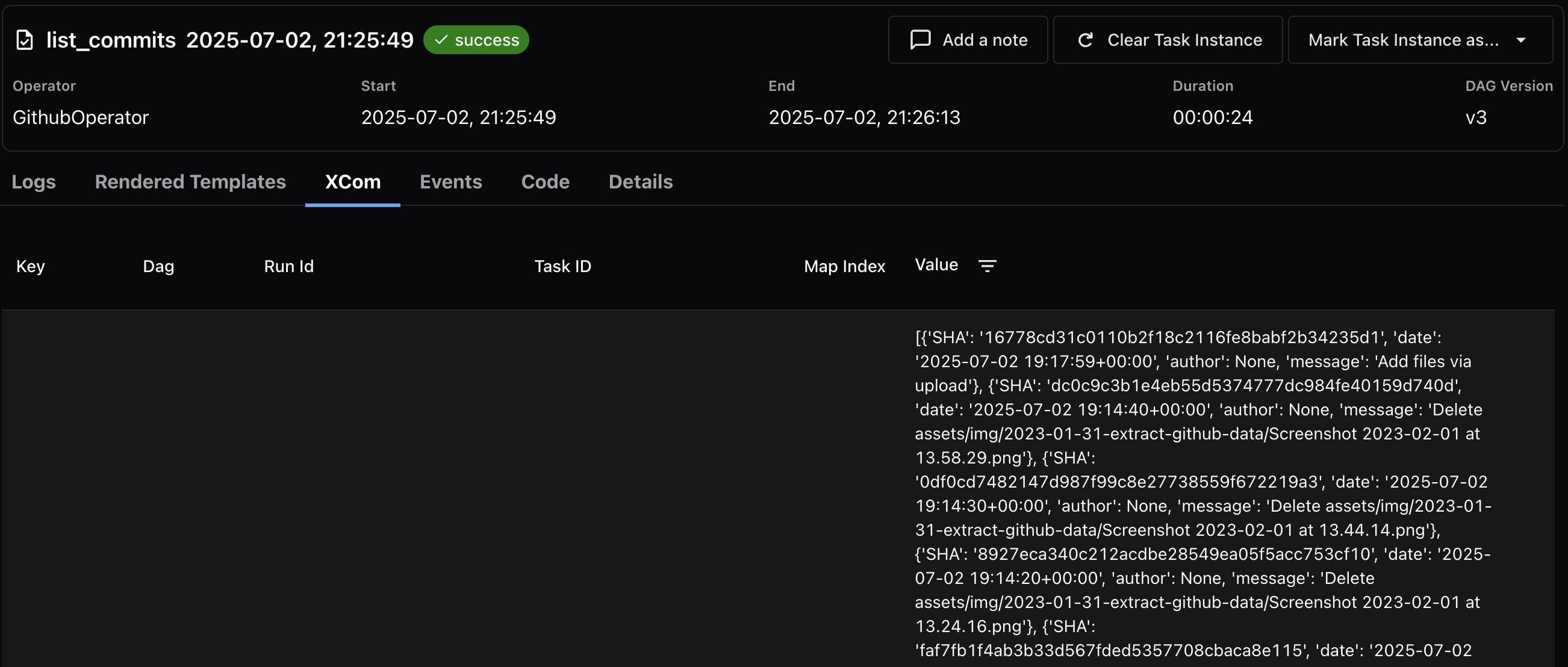Extract data from GitHub using Python and Airflow
PyGithub intro
Installation and access token
PyGithub is a Python library to interact with the GitHub API. It allows developers to access and manipulate GitHub resources such as repositories, issues, pull requests, and users. To install PyGithub, you can use the following pip command in your terminal or command prompt: pip install PyGithub.
To import the library, execute the following in the Python script: from github import Github.
Before you start writing the code, you need to generate a personal access token to interact with the API.
- Go to the GitHub website and sign in to your account.
- Click on your profile picture in the top-right corner and select Settings.
- In the left sidebar, click on Developer settings.
- Under Developer settings, click on Personal access tokens.
- Click on Generate new token.
- Give your token a descriptive name and select the permissions you need (see below).
- Click on Generate token.
I recommend the following minimum permissions, to begin with:
read:user – to access your account details.
repo – to interact with public and private repositories.
You will only be able to see the generated token once, so make sure to save it in a safe place. You can use this token to authenticate your API requests.
Basic classes and methods
Github class is the main class to interact with the GitHub API. It takes the personal access token as its argument.
1
2
3
# create an instance of the Github class and authenticate with a token
g = Github('') # paste your access token here
print(g)
1
<github.MainClass.Github object at 0x78a8030cfb50>
get_user() method returns the authenticated Github user.
1
2
3
4
5
6
7
8
my_user = g.get_user()
print(my_user)
print('Login:', my_user.login)
print('Name:', my_user.name)
print('Location:', my_user.location)
print('Bio:', my_user.bio)
print('Number of public repos:', my_user.public_repos)
1
2
3
4
5
6
AuthenticatedUser(login=None)
Login: thedarksidepy
Name: None
Location: None
Bio: Welcome to the Dark Side
Number of public repos: 1
get_repo() method returns a specific repository by its name and owner.
1
2
3
4
5
6
7
my_repo = g.get_repo('thedarksidepy/thedarksidepy.github.io')
print(my_repo)
print('Name:', my_repo.name)
print('Description:', my_repo.description)
print('Language:', my_repo.language)
print('URL:', my_repo.html_url)
1
2
3
4
5
6
Repository(full_name="thedarksidepy/thedarksidepy.github.io")
Name: thedarksidepy.github.io
Description: None
Language: Shell
URL: https://github.com/thedarksidepy/thedarksidepy.github.io
get_user().get_repos() method returns a list of repositories owned by the authenticated user.
1
2
3
4
5
6
7
8
9
10
11
12
my_repos = g.get_user().get_repos()
print(my_repos)
print('\n')
for repo in my_repos:
if repo.owner.login == my_user.login: # filter out repositories of my organization
print('Name:', repo.name)
print('Description:', repo.description)
print('Language:', repo.language)
print('URL:', repo.html_url)
print('\n')
1
2
3
4
5
6
<github.PaginatedList.PaginatedList object at 0x78a7e2d25610>
Name: thedarksidepy.github.io
Description: None
Language: Shell
URL: https://github.com/thedarksidepy/thedarksidepy.github.io
get_commits() method of the repository object returns a list of commits.
1
2
3
4
5
6
7
8
9
10
11
12
commits = g.get_repo('thedarksidepy/thedarksidepy.github.io').get_commits()
print(commits)
print('\n')
for commit in commits:
print('SHA:', commit.sha)
print('Author:', commit.author.name)
print('Date:', commit.commit.author.date)
print('Message:', commit.commit.message)
print('\n')
1
2
3
4
5
6
7
8
9
10
11
12
13
14
15
16
17
18
19
20
21
22
23
24
25
26
27
<github.PaginatedList.PaginatedList object at 0x78a7e2d6c510>
SHA: 2a974f4c409bb4d4d995279e9735e252a1160c88
Author: None
Date: 2025-07-02 16:47:31+00:00
Message: Update 2023-04-30-chat-gpt-and-data-engineering.md
SHA: c7de4f847a7d9568e4919597b123f7c01f96faf3
Author: None
Date: 2025-07-02 16:47:13+00:00
Message: Create authors.yml
SHA: a431560a9135c69cdb1c1fc58fb914734f353a02
Author: None
Date: 2025-07-02 16:45:58+00:00
Message: Update 2023-01-31-extract-data-github-python-airflow.md
SHA: 8a7d46ab66e5f61125d49b2d203155a16c921120
Author: None
Date: 2025-07-02 16:40:05+00:00
Message: Add files via upload
(...)
The get_contents() method in PyGithub is used to retrieve the contents of a file or directory in a GitHub repository. This method returns a ContentFile object for a file or a list of ContentFile objects for a directory. Each ContentFile object has information about the file, including the type (file or directory), the name, the path, and the content.
1
2
3
4
5
6
7
8
9
my_repo = g.get_repo('thedarksidepy/thedarksidepy.github.io')
sample_file = my_repo.get_contents('.gitmodules')
print('Type:', sample_file.type)
print('Name:', sample_file.name)
print('Path:', sample_file.path)
print('\n')
print('Content:', sample_file.decoded_content)
1
2
3
4
5
Type: file
Name: .gitmodules
Path: .gitmodules
Content: b'[submodule "assets/lib"]\n\tpath = assets/lib\n\turl = https://github.com/cotes2020/chirpy-static-assets.git\n'
1
2
3
4
5
6
7
8
9
my_repo = g.get_repo('thedarksidepy/thedarksidepy.github.io')
sample_dir = my_repo.get_contents('assets')
for content in sample_dir:
print('Type:', content.type)
print('Name:', content.name)
print('Path:', content.path)
print('\n')
1
2
3
4
5
6
7
Type: dir
Name: img
Path: assets/img
Type: file
Name: lib
Path: assets/lib
GithubOperator in Airflow
Installation and setup
You can use all PyGithub methods inside Airflow’s GithubOperator.
First, install the apache-airflow-providers-github library.
Next, create a GitHub connection.
- Go to the Airflow UI.
- Click on the Admin tab at the top of the page.
- Click on the Connections link on the left sidebar.
- Click on the Create button on the right side of the page.
- In the
Conn Idfield, entergithub_default. - In the
Conn Typefield, selectGitHub. - Fill in the remaining fields with the appropriate information for your GitHub account, such as the
LoginandPasswordorToken. - Click on the Save button to create the connection.
Similarly in Airflow 3, except you have to provide the access token in the Password field.
You should now see github_default listed under the Connections page and you can use it in your DAGs.
Import the GithubOperator as follows:
from airflow.providers.github.operators.github import GithubOperator
Get user data
The code below defines an instance of the GithubOperator class. This specific instance performs the get_user method with no arguments. The result of the API call is then processed using a lambda function that returns a formatted string containing information about the GitHub user.
1
2
3
4
5
6
7
get_user_info = GithubOperator(
task_id='get_user_info',
github_method='get_user',
github_method_args={},
result_processor=lambda user: f'''Login: {user.login},
Name: {user.name}''',
)
Get repo data
Similarly to the example above, you can retrieve information about a repository. The result of the API call is processed using a lambda function that returns a formatted string containing information about the GitHub repository. Note that the get_repo() method requires a full_name_or_id argument.
1
2
3
4
5
6
7
8
get_repo_info = GithubOperator(
task_id='get_repo_info',
github_method='get_repo',
github_method_args={'full_name_or_id':
'thedarksidepy/thedarksidepy.github.io'},
result_processor=lambda repo: f'''Name: {repo.name},
Description: {repo.description}''',
)
List repositories
Let’s return a list of all repositories’ names where the currently authenticated user is the owner.
1
2
3
4
5
6
7
8
list_repos = GithubOperator(
task_id='list_repos',
github_method='get_user',
github_method_args={},
result_processor=lambda user:
[repo.name for repo in user.get_repos()
if repo.owner.login == user.login],
)
Naturally, you can retrieve all the repo details as before. Let’s return a list of dictionaries. Each dictionary in the list contains the name, description, programming language, and URL of a repository. The repositories are filtered so that only those owned by the authenticated user are included in the list.
1
2
3
4
5
6
7
8
9
10
11
12
list_repos_details = GithubOperator(
task_id='list_repos_details',
github_method='get_user',
github_method_args={},
result_processor=lambda user:
[dict(name=repo.name,
description=repo.description,
language=repo.language,
URL=repo.html_url)
for repo in user.get_repos()
if repo.owner.login == user.login]
)
List commits
The below piece of code returns commits details. Each dictionary in the list contains the SHA, author name, commit date, and commit message for a single commit. The processed result is then returned by the lambda function and can be used in downstream tasks in the workflow.
1
2
3
4
5
6
7
8
9
10
11
12
list_commits = GithubOperator(
task_id='list_commits',
github_method='get_repo',
github_method_args={'full_name_or_id':
'thedarksidepy/thedarksidepy.github.io'},
result_processor=lambda repo:
[dict(SHA=commit.sha,
author=commit.author.name,
date=str(commit.commit.author.date),
message=commit.commit.message)
for commit in repo.get_commits()]
)
Get contents
Lastly, let’s retrieve the contents of the assets directory.
1
2
3
4
5
6
7
8
9
10
11
get_contents = GithubOperator(
task_id='get_contents',
github_method='get_repo',
github_method_args={'full_name_or_id':
'thedarksidepy/thedarksidepy.github.io'},
result_processor=lambda repo:
[dict(type=content.type,
name=content.name,
path=content.path)
for content in repo.get_contents('assets')]
)
Hands-on example: list all file paths in a repository
The below piece of code uses the PyGithub library to retrieve information about the contents of a GitHub repository.
The first line retrieves a Repository object for the repository with the full name thedarksidepy/thedarksidepy.github.io using the get_repo method of a Github object.
The second line retrieves the contents of the root directory of the repository using the get_contents method of the Repository object and stores them in the contents variable.
The rest of the code implements a while loop that uses pop and extend methods to traverse the contents of the repository and construct a list of file paths, stored in the files_list variable. The loop continues until the contents list is empty or has only one item. The loop checks the type of each content item, using the type attribute. If it’s a directory, it retrieves the contents of the directory using the get_contents method of the Repository object and appends them to the contents list. If it’s a file, its path is appended to the files_list list. The resulting files_list variable contains a list of file paths for all the files in the repository.
1
2
3
4
5
6
7
8
9
10
11
12
13
repo = g.get_repo('thedarksidepy/thedarksidepy.github.io')
contents = repo.get_contents('')
files_list = []
while len(contents) > 1:
file_content = contents.pop(0)
if file_content.type == 'dir':
contents.extend(repo.get_contents(file_content.path))
else:
files_list.append(file_content.path)
print(files_list)
1
2
['.editorconfig', '.gitattributes', '.gitignore', '.gitmodules', '.nojekyll', 'Gemfile', 'LICENSE', 'README.md', '_config.yml', 'index.html', '.devcontainer/devcontainer.json', '.devcontainer/post-create.sh', '.vscode/extensions.json', '.vscode/settings.json', '.vscode/tasks.json', '_data/authors.yml', '_data/contact.yml', '_data/share.yml',
(...)
The same can be implemented in Airflow. First, you need to define a Python function as follows.
1
2
3
4
5
6
7
8
9
10
11
def list_paths(repo, contents):
files_list = []
while len(contents) > 1:
file_content = contents.pop(0)
if file_content.type == 'dir':
contents.extend(repo.get_contents(file_content.path))
else:
files_list.append(file_content.path)
return files_list
Then call it inside the GithubOperator task. The result_processor argument is set to a lambda function that calls the list_paths function with the repo and repo.get_contents('') as arguments.
1
2
3
4
5
6
7
8
list_paths_task = GithubOperator(
task_id='list_paths_task',
github_method='get_repo',
github_method_args={'full_name_or_id':
'thedarksidepy/thedarksidepy.github.io'},
result_processor=lambda repo: list_paths(repo, repo.get_contents(''))
)







